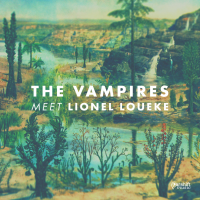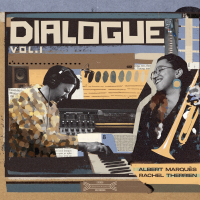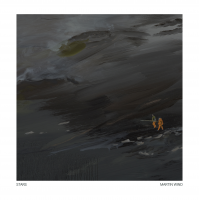Home » Jazz Articles » Bailey's Bundles » At the Louisiana Hayride Tonight
At the Louisiana Hayride Tonight
 Various Artists
Various Artists At the Louisiana Hayride Tonight
Bear Family Records
2017
During the period after World War I and before recorded music became the commodity it would in the 1970s, most popular music was associated with a locale. Nationwide distribution of recordings had yet to become the norm for dissemination, leaving local live performances an record labels and small-reach radio stations as the means that music was heard. While Frank Sinatra was ruling the more populous metropolitan airways, American Folk Music, in the forms of the blues and country music were taking root following the discovery in the 1920s and '30s by the makers of the first mass-produced phonographic equipment, that there was a market for such music. In a parallel fashion, blues was marketed as "race records" to the black community, while country or "hillbilly music" was marketed to the white working-class. A mode of distribution for country music manifest in regional variety shows often associated with a radio station on which the show was broadcast over the region. Radio "Barn Dances," as they were called, sprung up in the American interior, numbering in the scores. These included WBAP, Fort Worth and WLS, Chicago. These shows offered artists a stage on which to present their music in performance, providing them with an opportunity to make a living.
Two of the best know radio barn dances were Nashville, Tennessee's The Grand Ole Opry and Shreveport, Louisiana's Louisiana Hayride. Founded in 1925 as a one-hour program on Nashville's WSM-AM radio station, The Grand Ole Opry has become the longest-running radio broadcast in US history. It established itself as the outlet for the premiere artists, whose popularity was already nationally recognized, while providing upstart artists a place to ascend to that level of celebrity. The much younger Louisiana Hayride (founded in 1948) became a platform from which many artists rose to eventually appear on the Opry and beyond. Not as commercially refined or supported as the Opry, the Louisiana Hayride management felt itself free to offer new and untested talent an outlet to a larger audience. As such, the program provided a creative incubator for American country music not unlike that which the early-'40s Billy Eckstine band provided for bebop jazz and beyond. It was the Hayride where artists like Kitty Wells, Faron Young, Johnny Horton, Hank Williams, George Jones, Johnny Cash, Elvis Presley, and others took their careers from the regional to the national. At the same time, the show established a crack house band that would include musicians like Felton Pruett, Jimmy Day, Floyd Cramer, Sonny Trammell, James Burton, D. J. Fontana, Shot Jackson, and Tillman Franks.
The German Bear Family record label, long known for releasing exhaustively researched and punctiliously complete recording boxed sets, concentrating on American Roots Music, has assembled what can only be considered, an event. The statistics are impressive: 20 compact discs, featuring more than 167 acts, performing over 550 songs. At the Louisiana Hayride Tonight provides more than 25 hours of performances, commercials, and variety acts packaged in an LP-sized box with a meticulously detailed 224-page book containing reportage from Hank Williams biographer Colin Escott. It is an embarrassment of riches.
The first of 20 CDs is devoted to Hayride ephemera, including a recording by W.K. Henderson, owner of KWKH, high wattage radio stations bleeding in to his signal. The rest of the fist disc addresses pre-Hayride discs made for radio broadcast, setting the stage for the main course, 18 CDs featuring highlights of the Hayride's weekly shows, beginning with the first broadcast on April 3, 1948 debut and ending with the August 27, 1960 coda. The final disc highlights music from Hayride programs that KWKH broadcast from later in 1960 through 1965.
...and, that brief description does not begin to prepare the listener (and reader, in the case of the included book) for the vast expanse of material contained herein. I was frankly too intimidated to approach the task for several weeks. Like trying to grasp and move a large box on which I could gain no purchase, just cutting the shrink wrap on At the Louisiana Hayride Tonight was a big deal. I could not find a meaningful handle which to grasp and start writing...until I looked at the credits a noted a name that brought this lofty, historic release down to earth for me.
On disc 3, shoehorned between The Rhythm Harmoneers "Mountain Dew" and Jerry Green's "I Hate to Lose You Darlin'" is Tommy Trent's rockabilly archetype "No Muss, No Fuss, No Bother." Trent performed the song on the September 13, 1952 edition of the Hayride. That same month, Trent recorded and released perhaps his most famous song, "Paperboy Boogie" (B-side "Sweetheart I Am Missing You") for Checker Records, garnering some well-deserved recognition for his informed rockabilly sound. Thomas Francis Trent was born in Strawberry Plains, Tennessee in 1924. His professional entertainment career began in Knoxville, in 1942. Later he was involved with the Louisiana Hayride in the early 1950s and came to Arkansas in 1952 with KTHS radio. Trent was featured when KTHV (local Channel 11) television first went on the air. He showcased Arkansas talent on his program, which aired Saturday afternoons from 1958 to 1963 and he ran a hillbilly theme park in Little Rock called Tommy Trent's Fun Barn.
When I met Mr. Trent in 2000, he and his family were running the Shopper's News and Thrifty Nickle newspaper franchises, living in Bryant, just south of Little Rock, until his death from leukemia at 79-years old. Mr. Trent was the father of a local friend and grandfather of her son who played baseball with my. I met him many times and spoke with him without knowing this awesome backstory. It was not until after his death that I became aware of his local entertainment fame. My lesson was: this is how close this music is and how much we are all a part of it. While Hank Williams and Elvis Presley ruled the day at the Hayride, they were the exceptions. It was journeyman artists like Tommy Trent that provided the necessary basic fuel for the Hayride machine to run. It demonstrates that not even the greatest artists for out of a vacuum. Our handshake so long ago gave me the needed hold on this immense collection.
After gaining purchase with Trent's single contribution to the set, I moved out to look at the bigger artists, noting career arcs as I listened. Causing the biggest stir are the four tracks by Hank Williams, including a previously unknown recording of "I'm a Long Gone Daddy." Rolling Stone magazine incorrectly reported the version of "Jambalaya (on the Bayou)" that appears on At the Louisiana Hayride Tonight as being previously unreleased, though it appeared on The Original Louisiana Hayride Archives -Classic Country Radio Vol. 1 (One Media Publishing, 2006). Williams' contributions to the Hayride reflect the arc of his brief career.
Williams first appeared at the Hayride on August 7, 1948, appearing as the fifth act on the opening 8:00—8:30 PM segment, performing "Move It On Over," a song he had originally released the year before, rising to number 4 on the US Country charts. He was a mere 18 months into a brief six-year recording career. Williams recorded the included "Mind Your Own Business" later in the show. By all accounts, Williams barely made it on the Hayride because of his reputation for drinking. Beg, steal, or borrow, he made it on the show. The aforementioned "I'm a Long Gone Daddy" was performed four months later, on the November 13, 1948 show. By the time he released "Lovesick Blues" in 1949, The Grand Ole Opry was in his sights.
In the next short-lived four years, Williams' career peaked during his Hadacol tour, August-September, 1951. Later that year, Williams suffered a back injury that led to his increased consumption of alcohol, morphine, chloral hydrate, which in turn, led to his famous dissolution and dismissal from the The Grand Ole Opry August 11, 1952. He recorded "Jambalaya (on the Bayou)" the previous June of that year, playing it, once again, on the Hayride, where he had yet to burn his bridge, appearing September 13, 1952. Four months later, on January 1, 1953, Williams died in the back seat of his personal Cadillac, driven by college student, Charles Carr, between Bristol, Virginia and myth and legend.
While the complete arc of Hank William's career is documented in the microcosm of this set, the ascendancy of another, perhaps greater artist was to begin on October 16, 1954. Included in At the Louisiana Hayride Tonight, is Presley's first performance on October 16, 1954. He performed "That's All Right" and "Blue Moon of Kentucky" the A and B side, respectively of this first Sun Records single recorded that previous July 5th and released July 19th. The music, barely three months old, detonated among the more conservative country music that surrounded him on the show stage that night. Stage banter included, these performances signaled that a new musical order was in the offing. Presley appeared at six more Hayrides where he was recorded, between his first show and his extended December 16, 1956 performance (made famous by the announcement that, "Elvis has left the building..." All total, Presley performing a total of 25 songs at the Hayride, 16 of which appear on At the Louisiana Hayride Tonight. These performances, particularly the first ones, are among the most electric of the early rock era. Presley's recorded (and bootlegged) appearance at Little Rock's Robinson Auditorium May 16, 1956 further solidifies his growing legend coming out of the Hayride.
Other critical highlights include 11 songs by George Jones; four selections from Roy Acuff; and eight performances from Johnny Cash, including "I Walk the Line," "Hey Porter," and "Give My Love to Rose." Also included are Slim Whitman, Ernest Tubb, Roger Miller, Marty Robbins, and Doug Kershaw.
There is perhaps too conveniently a comparison between At the Louisiana Hayride Tonight and Harry Smith's ground-breaking Anthology of American Folk Music, first released in 1952. That six-LP collection of blues, folk, and country music from the late 1920s and early 1930s influenced a whole generation of artists. I will argue that the depth and breadth of the music presented at the Louisiana Hayride shows can have a similar impact. Hyperbole? Perhaps, but the music contained herein is this important.
Tags
PREVIOUS / NEXT
Support All About Jazz
 All About Jazz has been a pillar of jazz since 1995, championing it as an art form and, more importantly, supporting the musicians who make it. Our enduring commitment has made "AAJ" one of the most culturally important websites of its kind, read by hundreds of thousands of fans, musicians and industry figures every month.
All About Jazz has been a pillar of jazz since 1995, championing it as an art form and, more importantly, supporting the musicians who make it. Our enduring commitment has made "AAJ" one of the most culturally important websites of its kind, read by hundreds of thousands of fans, musicians and industry figures every month.





















